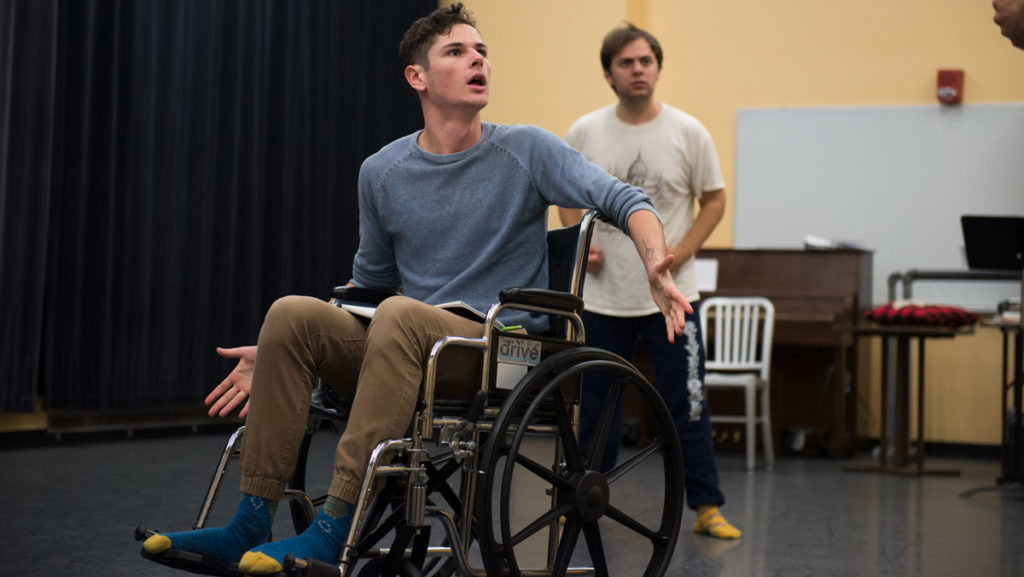After ingesting Valium, Harper Pitt, a middle-aged woman, is transported into a mystical alternate reality. Drifting across the stage, she meets Prior Walter, who, having a fever dream, is trapped in the same alternative universe she is. Dressed in drag, Prior reveals to Harper that her husband is gay. When the duo awake from their alternate realities, they continue to struggle through the 1980’s AIDS crisis.
This year, Ithaca College students will embody these individuals in Tony Kushner’s Pulitzer Prize–winning play “Angels in America, Part 1: Millennium Approaches.” It will be performed Oct. 3, 5–8, and 10–13 in the Dillingham Center’s Richard M. Clark Theatre.
“These two people who would never have met in their ordinary lives meet in this impossible and magical space, and they find that they have an extraordinary and unexpected connection,” Claire Gleitman, professor in the Department of English, said. “It’s one of the most remarkable scenes in all of the contemporary drama, I think.”
Gleitman utilized Kushner’s “Angels in America” in her courses “Anxious Masculinity on the American Stage” and “Modern and Contemporary American Drama.”
The play will be performed on an arena stage, where the audience is seated on all sides of the performers. Senior Sam Hurley, assistant director for the performance, said this setup allows the work to be more engaging and active for the audience. She said that following the script closely also allows the play to be more engaging for viewers.
“We’re keeping this very clear and close to the text,” Hurley said. “This is a three-hour play, and we’re not cutting any of it because we feel everything said is so vital to every aspect of the story and to understanding these characters. It’s a story about humans and human relationships, so keeping the structure as pure and simple is the best.”
Junior Joshua Wilde, who plays Louis, said connecting with Louis has been difficult because of the bleak situations the character must grapple with.
“What I see in Louis is this moral difficulty,” he said. “He’s trying so hard to do the right thing, but he doesn’t want to see the person he loves the very most go through one of the very most horrific and unknown diseases that’s ever hit America.”
While the play is mostly realistic, it contains elements of fantasy and magic. For this reason, Gleitman said, the play is hard to categorize by genre.
“[‘Angels’] has elements of realism,” Gleitman said. “But its realistically drawn characters have regular encounters with ghosts: A woman having a Valium-induced hallucination wanders into a total stranger’s dream, and an angel suddenly bursts through a sick man’s ceiling. ‘Angels’ is hypertheatrical, and it refuses to conform to any rules.”
Gleitman said the complexities of Kushner’s characters tap into the themes within the play.
“A central theme in ‘Angels’ is the very American impulse to move, to migrate, to pick oneself up and go somewhere else,” she said. “All Americans who are not Native Americans journeyed to get here, by choice or by force, and the play suggests that that journey is deep in the American DNA. To underscore this, Kushner fills his play with characters who are on epic journeys.”
While the play takes place in the ’80s, Wilde said the themes and characters within “Angels in America” are still as relevant as ever, specifically to the LGBTQ community.
“They’re very human, as cliche as that is to say,” Wilde said. “Their struggles are very, very tangible. Especially in our country right now. The AIDs epidemic was only 30 years ago, so it’s very fresh in our nation’s history, so a lot of people who come to the show can think, like, ‘I remember this time. I’ve lived through this time.’”
Robert Moss, who has directed and produced works at the Hangar Theatre and Syracuse Stage, will be directing the main stage performance. Senior Ryan Dickson, who works for the Ithaca College Theater Marketing Team, said that working alongside Moss was an honor for him and other students.
“It’s really amazing that the students at our college — we get to work with someone like Rob Moss on and off the stage,” Dickson said. “Just to work with someone with the breadth of knowledge he does about the theater world. … A lot of us students are training to become the next Rob Moss.”
Dickson said that when he first read Kushner’s play in one of Gleitman’s classes, he instantly was entranced by the story.
“When I read it last semester … there’s a lot of stuff present that you see relevant to today,” Dickson said. “I think [the play is] pertinent now because history is cyclical. I think it’s interesting that you can take a step back and think, ‘Oh, these concepts and themes are relevant to today’s society.’”
Tickets are available to students for $10 at ithaca.ticketforce.com.








